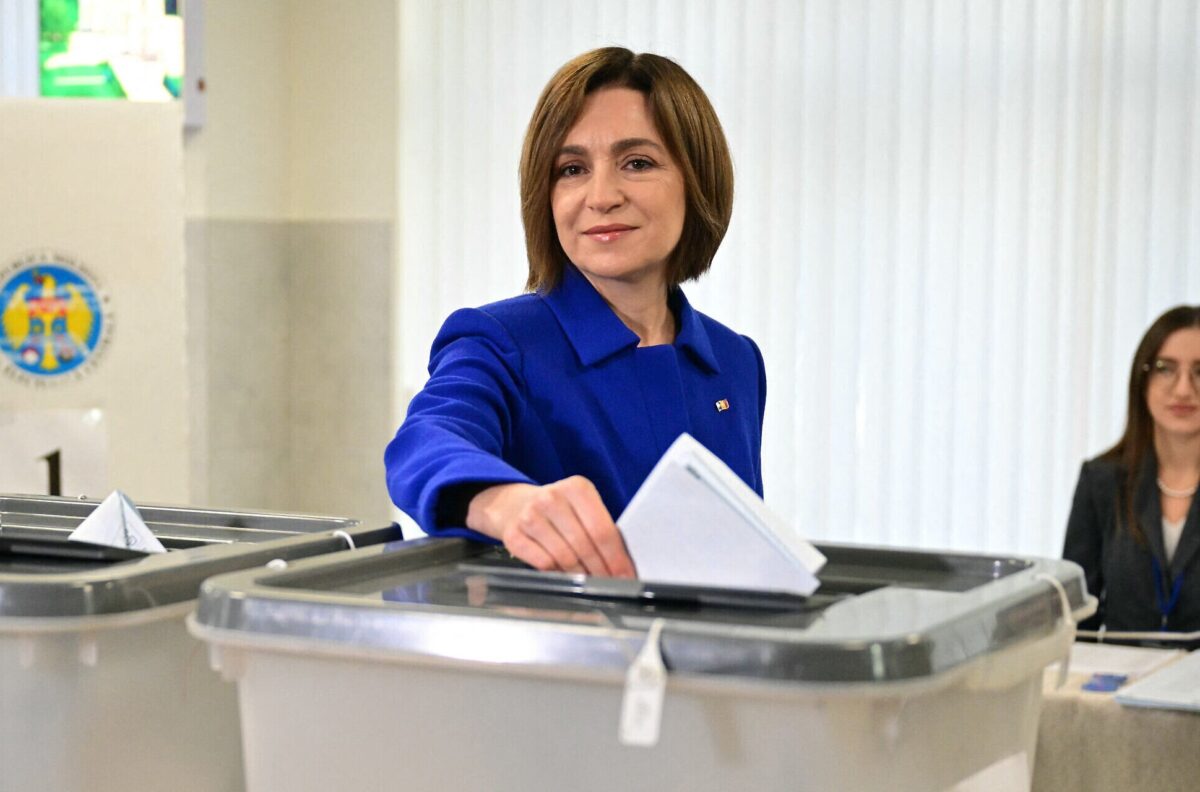Moldova Elections: What does the Pro-EU victory mean for its European future?

Moldovan President Maia Sandu casts her ballot in the parliamentary election in Chisinau on September 28, 2025. Image Credit: Daniel MIHAILESCU/AFP
Moldova ruling Party of Action and Solidarity (PAS) has won a decisive victory in the country’s 2025 parliamentary elections, strengthening its push toward European Union membership despite fierce resistance and allegations of Russian interference.
President Maia Sandu, who has made EU integration a cornerstone of her leadership, warned voters ahead of the ballot that Moldova’s young democracy was at risk. With more than 99% of votes counted, PAS captured nearly 50%, far outpacing the pro-Russian Patriotic Bloc, which secured just over 24%.
The result is being hailed as the most consequential election since Moldova’s independence, with implications not only for the country’s internal politics but also for regional stability in Eastern Europe.
PAS Victory Strengthens Moldova’s European Path
Led by parliamentary speaker Igor Grosu, PAS will hold a majority in the 101-seat parliament, allowing it to govern without coalition partners. This solidifies Moldova’s pro-Western course and boosts its bid to join the European Union by 2030.
European leaders welcomed the outcome. Ursula von der Leyen, President of the European Commission, wrote:
“You made your choice clear: Europe. Democracy. Freedom.”
Meanwhile, Poland’s Prime Minister Donald Tusk praised Maia Sandu for
“saving democracy” and “stopping Russia’s attempts to destabilize the region.”
French President Emmanuel Macron also hailed the apparent results of the elections, saying:
“Despite attempts at interference and pressure, the choice of Moldovan citizens has been strongly affirmed.
“France stands alongside Moldova in its European project and its drive for freedom and sovereignty.”
The victory comes at a time when Moldova has already been granted EU candidate status and is pushing forward reforms to meet Brussels’ standards.
Russian Interference and Election Tensions
The elections were overshadowed by allegations of massive Russian interference. Moldovan authorities reported disinformation campaigns, illicit funding, and attempts to destabilize polling stations, including bomb threats in Moldova and across Europe.
Sandu warned voters: “Don’t play with your vote or you’ll lose everything.” Despite these warnings, voter turnout reached 52%, higher than recent elections, reflecting widespread concern about the country’s democratic future.
Opposition leader Igor Dodon and his Patriotic Bloc disputed the results, claiming fraud and calling for street protests outside parliament. Authorities have since arrested several people accused of plotting unrest.
READ ALSO
Is Rachel Reeves about to raise taxes? Chancellor faces tough questions ahead of budget
Benjamin Netanyahu at UN: What his Gaza pledge and rejection of Palestinian Statehood mean
Transnistria and Moldova’s Geopolitical Struggle
The pro-Russian breakaway enclave of Transnistria, home to a Russian military presence, once again highlighted Moldova’s internal divisions.
Voter participation in Transnistria dropped sharply due to bomb threats and alleged voter harassment, though many residents traveled long distances to cast their ballots. While some supported Moldova’s EU direction, others openly expressed loyalty to Moscow.
The outcome underscores the delicate balance Moldova faces, caught between a European future and Russian pressure. For citizens like Dan Spatar from Chisinau, the choice was clear:
“We voted for this four years ago and deserve to continue with it. We see what happens every day in Ukraine and we worry about that.”
What This Means for Moldova’s Future
PAS’s win means Moldova is likely to accelerate its EU integration process, strengthen reforms, and distance itself further from Moscow. However, challenges remain, corruption, economic hardship, and separatist tensions could slow progress.
For the EU, Moldova’s choice is symbolic: another former Soviet republic aligning with Brussels while Russia wages war in Ukraine. For Russia, it’s a reminder that its influence in Eastern Europe is increasingly contested.
FAQ – Moldova Elections 2025
Q1: What happened in the Moldova elections 2025?
Moldova’s pro-EU Party of Action and Solidarity (PAS) secured nearly 50% of the vote, defeating the pro-Russian Patriotic Bloc. This gives PAS a clear parliamentary majority.
Q2: Who won the Moldova elections?
The PAS party, led by President Maia Sandu and Igor Grosu, won the elections with around half the votes, while the Patriotic Bloc came second with about 24%.
Q3: Did Maia Sandu’s party win a majority?
Yes, PAS will control a majority of seats in parliament, allowing it to form a government without coalition partners.
Q4: How did Russia interfere in the elections?
Authorities reported Russian-backed disinformation, funding networks, and coordinated unrest attempts. Bomb threats and cyberattacks also disrupted voting.
Q5: Why are Moldova’s elections so important for Europe?
The elections determine whether Moldova stays on a pro-European path toward EU membership or drifts back toward Russia’s influence.
Q6: Is Moldova joining the EU after these elections?
Not yet. Moldova is an EU candidate and hopes to join by 2030, but must pass reforms and gain unanimous approval from EU member states.
Q7: What is the Patriotic Bloc in Moldova?
A pro-Russian political alliance led by Igor Dodon that campaigned against EU integration. It has rejected the election outcome.
Q8: Why are protests happening in Moldova?
The Patriotic Bloc claims election fraud and has called supporters to protest outside parliament, raising fears of unrest.
Q9: What challenges does Moldova face after the elections?
Despite PAS’s victory, Moldova struggles with corruption, economic difficulties, Russian influence, and separatist tensions in Transnistria.
Q10: What did the EU say about the results?
EU leaders praised Moldova’s choice. Ursula von der Leyen said the vote reaffirmed Moldova’s commitment to democracy, freedom, and Europe.
Q11: How high was voter turnout in the elections?
Turnout was 52%, higher than previous years, reflecting strong public interest in Moldova’s democratic direction.
Q12: What role did Transnistria play in the vote?
Turnout from the Russian-backed enclave was lower than before, with reports of bomb threats, harassment, and logistical barriers affecting participation.

